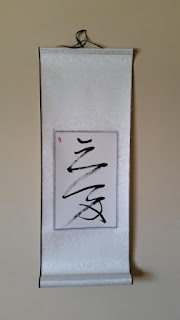Greeting all.
Well I have returned to offer some thought and ideas.
This time I am writing about our penchant to want to control outcomes.
We would all like to feel we have the power to control cause and effect. That is, to control how things turn our in our lives.
"If I do this,
then that will happen."
For example:
If I take this medicine,
I will feel beter.
If I am nice to you,
you should be nice to me.
If we teach our children
they will learn.
I I study hard,
I will get an A
If I am a perfect parent,
my children will be happy and well adjusted.
We all want to think we can cause things to be the way we want. This is a rather linear way of thinking about how the world works. If I do A then B will happen.
In the retreats I offer, I talk about the two aspects that go into our need to control outcomes.
1) Insistence
2) Resistance
We insist that things go the way
we want, and then we resist things when they turn out differently. This is the basis of much of our suffering and frustration.
We are learning everyday that everything from the tiniest sub-atomic particles to the largest galaxies do not control one another, rather they influence each other. We have also learned that just by observing an event we exert an influence on what occurs! Just being present effects outcomes that we often are not even aware of.
When I was in college I was taught the proper experimental method. Develop a hypothesis, introduce and independent variable and measure the dependent variable. For example: Smiling more will reduce conflict in couples. Introduce different levels of smiling and measure the results. Except something was happening. The cause and effect was not 100%. I learned that I could not control all confounding variables. So, the best I could do was offer the results as a degree of influence.
There goes linear thinking. A does not always cause B. A might cause B to happen but there are often so many other things going on with B that we can only guess how much A causes B. In fact, we can only say how much A influences B.
So what do we do?
Shift our approach to ourselves, others, and the world from one of control to influence. To place our attention and energy in offering what each situation is asking from us. Offering at any given moment, the most positive influence on this process.
I am sure Jim Harbaugh would have loved to control the outcome of the last Super Bowl. All he could do was prepare his team in order to have the greatest influence in the process of the game.
Influence on the process.
Stuck in traffic and late for a meeting? Pounding on the dashboard and yelling is trying to control outcomes. Get other drivers to do what we want, thinking we can control the stop lights: insistence (insist that you make all the lights to your destination) and resistance (blaming Murphy's Law, the driver ahead of you, the weather).
Taking a deep breath and listening to some calming music, talk with your partner about the grandkids, notice the sunrise, are all ways to more positively influence the process that is occurring (you sitting at a red light). What is occurring will not necessarily change at your beckon, how you respond will influence the quality of your life and those around you!
You can influence how you respond, you cannot control the universe!
So, the next time you find yourself in insistence and resistance mode, take a deep breath and ask yourself:
What can I do to help?
How can I best influence in the most positive way possible?
What is something constructive I can offer?
Is my response making this situation better or worse?
Our lives are going to unfold as they do. We do not drive the unfolding of events. We can show up with the most patient, open and compassionate perspective possible.
When we shift our efforts to influencing the process we can relax a bit. We can now look at things as "how close can I get." Rather that "can I get what I want?" "
If I study hard, let's see how close I can get to geting an A.
If I change my diet and exercise let's see how much better I will begin to feel.
If I am not as defensive let's see how people around me respond.
The shift from to "it has to be a certain way", to "let's see what happens." There are just far to many factors that effect outcomes that we have no control over. To continue to insist that if you do A then you can expect B, is to ignore how events come into being.
So in closing, let go of the need to control outcomes and work with situations as they arise with greater patience, openness and compassion. This will enhance the quality of your life in many ways. I won't say in which ways because that will be just trying to control outcomes again. Just show up and see what happens when you let go of your insistance to control outcomes.









.jpeg)







